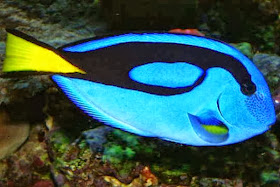Palette surgeonfish is found in the Indian Ocean and western Pacific Ocean, which ranges
results in the Andaman Sea to East Africa, Christmas Island, and Bali in
Indonesia.
This
fish is a fish inhabitant of shallow marine environment, coral coast of the
island at a depth of 0-25 meters. It is usually found on reef flats and along
the slope to the sea. He lived alone or form large aggregations that eat
together. This
fish has a blue base color and a white chest. The head is black and decorated
with a broad white stripe that runs from the throat to the pectoral fin base. Anal
and pelvic fins are white. Dorsal fin is yellow with white fringe and black lines.
Palette surgeonfish is a sensitive species and can only be recommended for professional marine aquarists with large aquarium. Unlike many other species of reef fish, this fish has a large territory in the wild, so they will be difficult to adjust to life in the aquarium. This fish should be placed in a large aquarium, because it is a strong swimmer. A specimen can be kept small enough in size that is not too large aquarium, aquarium recommended length must exceed 6 times the length of the body, for example you have a fish with a body length of 10cm long aquarium you need at least 60cm or more, due to the long aquarium, will making can swim freely .
Aquarium water conditions should be stable and under conditions adapted to their needs as completely as possible. Wait until you have an aquarium with lots of moss because these fish are herbivorous fish species. In the wild, algae, and small plants were found in the crevices of the reef is the main food of these fish. Provide a variety of foods, such as fish feed fresh or dried seaweed and boiled vegetables such as broccoli, carrots and spinach. Should add some kind of flake or pellet rich in vitamin C to reduce the risk of declining health, occasionally, you can give a few pieces of shrimp.
Aquariums should contain a lot of Live Rock. Aquarium reef aquarium is good to preserve Palette surgeonfish because these fish live in the reef area.





No comments:
Post a Comment